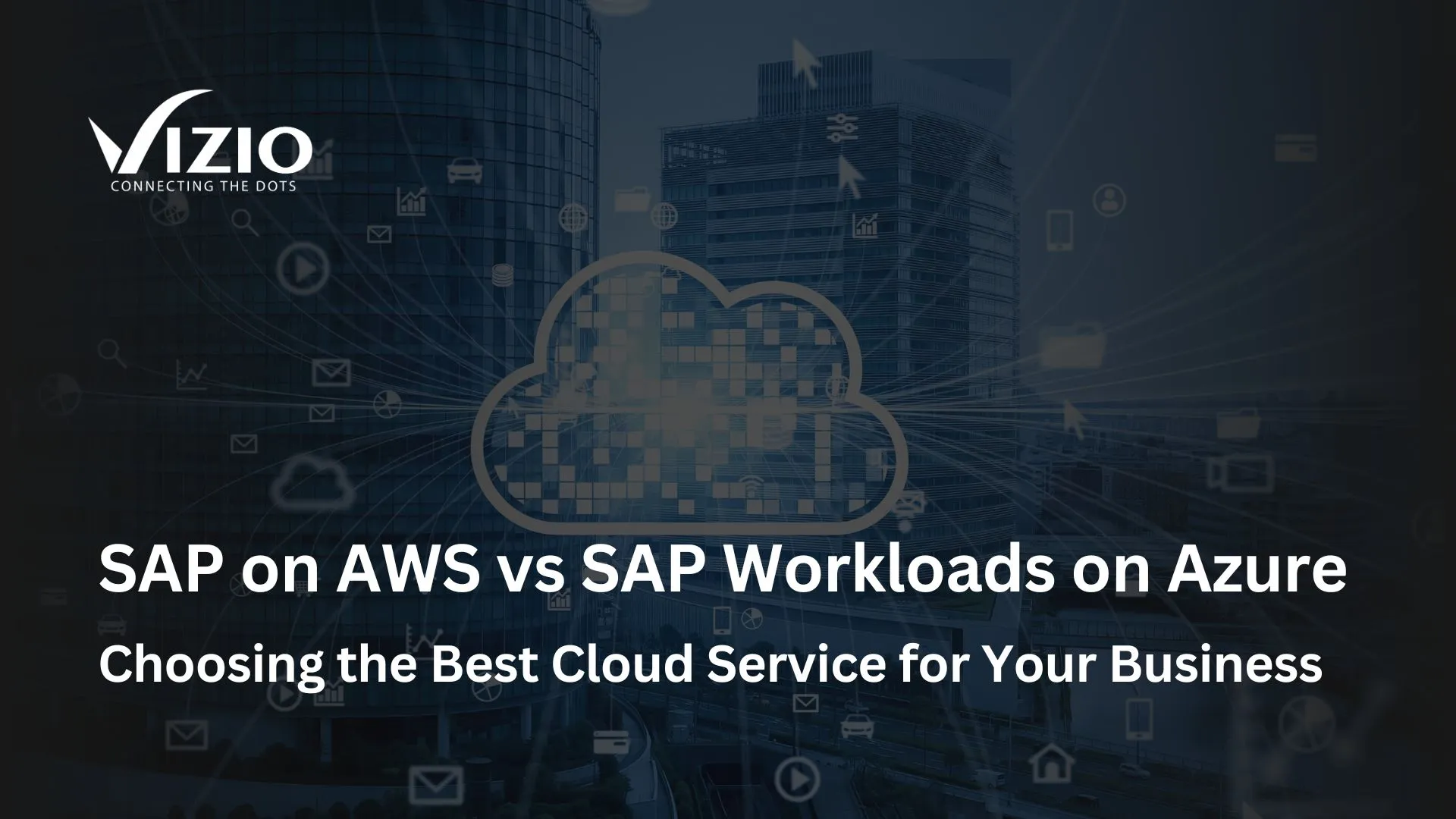In today’s rapidly evolving business landscape, leveraging cloud solutions has become a necessity for organizations looking to optimize their operations and enhance customer relations. For businesses utilizing SAP solutions, the challenge lies in selecting the ideal cloud platform to complement their SAP resources. Two prominent competitors in this space are Microsoft Azure and Amazon Web Services (AWS). In this article, we will analyze the distinct offerings of SAP on AWS and SAP workloads on Azure to help you make an informed decision based on your unique needs.
What is SAP?
SAP, which stands for systems, applications, and products, is a software solution that centralizes data management in businesses. Traditionally, data is stored in separate databases across various business functions, leading to challenges in accessing and integrating information. SAP software resolves this issue by providing a unified view of data, enabling efficient management of complex business processes and real-time insights across the enterprise.
Why Choose SAP on AWS?
Running SAP HANA or S/4HANA on the cloud offers numerous benefits, including the elimination of infrastructure management burdens. With AWS as your cloud provider, you can focus on core business functions without worrying about hardware and IT infrastructure maintenance. Cloud-based deployments also ensure access to frequent and automatic updates, enabling you to leverage the latest features and improvements.
AWS, as a pioneer in cloud computing, offers a robust and sophisticated cloud platform. By leveraging AWS cloud services, businesses can embark on a digital transformation journey, gaining access to cutting-edge technologies and tailored solutions. The collaboration between SAP and AWS revolutionizes business operations, providing enhanced performance, cost efficiencies, and heightened security.
How Does SAP AWS Migration Occur?
SAP AWS migration can follow different approaches depending on specific business needs. One approach is the “lift-and-shift” method, where applications are migrated as they are to the AWS cloud. Adjustments may be required to ensure a seamless transition from legacy environments.
Another scenario involves upgrading from non-HANA database systems to HANA and S/4HANA on AWS. This move enables companies to leverage HANA’s powerful in-memory database capabilities and reduce total cost of ownership.
Alternatively, a complete transformation to S/4HANA on AWS can be achieved using a greenfield approach, starting anew without legacy systems. The “RISE with SAP” program offers a gradual migration path, facilitating a smooth transition over time. Partnering with SAP-certified service providers, such as Protera, can ensure successful and accelerated migration processes.
Benefits of SAP on AWS
The partnership between SAP and AWS brings about significant changes by combining SAP’s enterprise solutions with AWS’s cloud infrastructure. Running mission-critical SAP workloads on AWS enables organizations to achieve enhanced performance, cost savings, and heightened security.
Cost Savings
Migrating to AWS hosting for SAP workloads can result in substantial cost savings. SAP itself reports that companies experience cost reductions ranging from 59-71% over a five-year lifecycle. These savings encompass hardware and software investments, implementation costs, continuous improvement, and upgrade expenses.
Reliable Infrastructure
AWS’s global infrastructure covers 25 regions and 80 availability zones, providing global enterprises with the ability to design applications near their customers and comply with local legal and regulatory requirements.
Innovation Potential
Running SAP on AWS allows businesses to access tools that optimize the customer experience, such as AWS IoT and AI tools. AWS continuously introduces new features and services based on customer feedback, ensuring updates specifically designed to improve SAP operations.
Data Security
AWS prioritizes data privacy and security, boasting 90 security standards and compliance certifications, as well as 100% encryption capability across all services storing customer data.
Why Choose SAP on Azure?
Microsoft Azure aims to optimize its cloud platform to run SAP workloads, providing high flexibility and availability for end users. Migrating SAP resources to Azure opens the pathway to various management, analytics, and AI tools to leverage SAP resources effectively.
Similar to AWS, Microsoft has made significant investments in optimizing its cloud services for SAP workloads. Azure offers a range of SAP-certified VM sizes and seamless integrations with SAP solutions. With a well-distributed infrastructure across regions, Azure empowers organizations to deploy their SAP workloads effortlessly in multiple locations worldwide.
Benefits of SAP on Azure
SAP on Azure combines the power of SAP’s enterprise solutions with the flexibility and scalability of Microsoft Azure’s cloud infrastructure. Choosing SAP on Azure provides the following benefits:
Higher Agility
Azure’s scalable cloud infrastructure allows businesses to swiftly adapt to changing needs. This agility is crucial in today’s dynamic market conditions.
Lower Costs
By eliminating upfront hardware investments and utilizing cost-efficient pay-as-you-go pricing models, SAP on Azure can significantly reduce costs.
Less Complexity
Azure’s managed services simplify operations, freeing up resources for strategic tasks.
Higher Innovation
Azure’s AI and analytics power drive data-driven decisions and enable businesses to pioneer new experiences.
Performance and Scalability
Both SAP on AWS and SAP Workloads on Azure offer high-performance computing capabilities and the flexibility to scale resources according to demand. SAP on AWS leverages a longstanding partnership with SAP, providing exceptional integration and support for SAP workloads. AWS offers a range of optimized instances tailored specifically for SAP applications, ensuring seamless and efficient performance.
On the other hand, SAP Workloads on Azure benefit from Microsoft’s investments in optimizing its cloud services for SAP workloads. Azure provides a diverse selection of SAP-certified VM sizes and seamless integrations with SAP solutions. With a well-distributed infrastructure across regions, Azure enables organizations to deploy their SAP workloads effortlessly in multiple locations worldwide.
Cost Evaluation
When evaluating costs, it is crucial to consider the pricing structures and usage patterns of each platform. Conducting a meticulous cost analysis is essential to determine the most cost-effective option tailored to your organization’s requirements. Both AWS and Azure offer expansive ecosystems of additional services beyond SAP-specific offerings, enhancing overall cloud strategies and fostering innovation.
Security and Compliance
Security and compliance are paramount when choosing a cloud platform. Both AWS and Azure adhere to rigorous standards, providing robust security features, certifications, and comprehensive data protection mechanisms. They meet diverse regulatory requirements, ensuring data integrity and confidentiality.
Ultimately, the choice between SAP on AWS and SAP Workloads on Azure depends on several factors, including your organization’s infrastructure, expertise, and overall cloud strategy. Seeking advice from cloud experts and SAP specialists can provide valuable insights to make an informed decision.
Conclusion
In conclusion, choosing the best cloud service for your SAP workloads requires a comprehensive evaluation of your business requirements, technical capabilities, and long-term goals. While both SAP on AWS and SAP Workloads on Azure offer robust solutions, it is essential to consider factors such as performance, scalability, cost, security, and compliance. By making an informed decision, you can optimize your cloud environment and harness the full potential of your SAP workloads.

